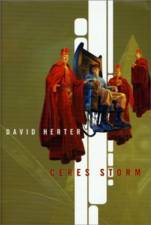

| Click on a book's image or title to order from Amazon.com |

Ceres Storm
Tor, HC, © 2000, 255 pp, ISBN #0-312-87493-6Reviewed February 2001
With its striking cover and intriguing jacket synopsis, Ceres Storm looks like an interesting novel of hard science fiction. However, while Herter's use of language is curious and intricate, the story itself is quite thin, and its use of technology is often confusing and rarely rewarding.
The focal character of the story is Daric, a young teenager who lives on Mars about 10,000 years in the future, with his guardian Jonas. There he regularly talks to his Grandpapa, who seems to be an artificial intelligence, possibly simulating a now-dead person. One day, Daric is sent into the nearby city to consume an information drink, which puts him loosely in touch with the larger community of starfarers. He soon learns that he, Jonas and Grandpapa are all clones of the ancient leader Darius, who ruled humanspace millennia ago, and one of his clones (Grandpapa?) was responsible for containing a runaway nanotech storm which ruined the Earth. Now, Daric is apparently intended to take up Darius' mantle, although other forces in the solar system want to stop him or use him for their own ends.
If that synopsis sounds befuddling, it's because I found the story in Ceres Storm to be bewildering. The motivations of the characters and the nature of their conflicts are greatly obfuscated. Daric is mostly subject to forces beyond his control and it's not clear that he has even the barest clue of what he's doing or why (not a good characteristic for your main character). His forebear Darius clearly had access to some tremendous technology, and the powerful KayTee Clan in Daric's era clearly wants access to it, but their methods don't make much sense. (Why not brainwash Daric? Or take more deliberate measures to ensure he does their bidding? And exactly who are they and who has to answer to them? The solar system doesn't seem to have a unified government - or much of any government at all.)
The biggest problem with the book is that we never learn the reasons behind why anything is going on. What is Daric being used for? Why is now the time that forces have decided to get him involved in whatever greater game is going on? What exactly is going on? By the end of the book nothing has clearly been resolved, nor is it even clear what there was to resolve.
Herter says on Amazon.com that this is the first book of a series. But how can I want to find out what happens next if I don't even know what happened here?
The book's upside is Herter's often-intriguing use of language and structure (which would be more effective in the service of a tighter plot with stronger characterizations), as well as its use of technology (minds being stored in "century roses", and the extravagant and typical use of cloning and artificial intelligence, suggesting a very peculiar culture based on such exotica made commonplace).
When I read about this book, I was expecting something more akin to a "resurrection of empire" story involving high technology and the story of the nanotech storm which razed the empire in millennia past. Or at least something somewhat resembling that. But I was very disappointed in the book as written. I hate to say it, but this book might have been best condensed as a 40-page introduction to a much longer story.
hits since 10 February 2001.